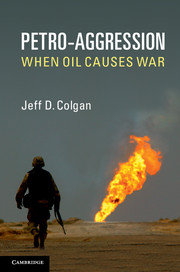Book contents
- Frontmatter
- Contents
- Figures
- Tables
- Acknowledgments
- 1 Introduction
- 2 A theory of oil, revolution, and conflict
- 3 Evidence and research design
- 4 Quantitative impact of oil and revolution on conflict
- 5 Iraq
- 6 Libya and the Arab Jamahiriyya
- 7 Iran
- 8 Venezuela and the Bolivarian Revolution
- 9 Saudi Arabia
- 10 Does oil cause revolution?
- 11 Conclusion and policy implications
- References
- Index
8 - Venezuela and the Bolivarian Revolution
Published online by Cambridge University Press: 05 February 2013
- Frontmatter
- Contents
- Figures
- Tables
- Acknowledgments
- 1 Introduction
- 2 A theory of oil, revolution, and conflict
- 3 Evidence and research design
- 4 Quantitative impact of oil and revolution on conflict
- 5 Iraq
- 6 Libya and the Arab Jamahiriyya
- 7 Iran
- 8 Venezuela and the Bolivarian Revolution
- 9 Saudi Arabia
- 10 Does oil cause revolution?
- 11 Conclusion and policy implications
- References
- Index
Summary
Serious leadership is needed, not irresponsible populism.
– Hugo ChávezThe politics of Iraq, Libya, and Iran provide significant evidence in support of the argument that petro-revolutionary regimes tend to have highly aggressive foreign policies. Because those states are all in the Middle East/North Africa, one might wonder whether there is something special about the region itself. As I argued in Chapter 4, the evidence is strongest in the Middle East because that region is home to most of the world’s petrostates, and therefore most of the petro-revolutionary governments. Yet there is no theoretical reason to expect that the argument fails outside of the region. I expect the argument to apply outside of the Middle East wherever there is both a revolutionary government and an economy dominated by the oil industry. This chapter focuses on one such case: Venezuela under the leadership of President Hugo Chávez.
From his bombastic rhetoric and activist foreign policy to his controversial political and economic reforms at home, Chávez is one of the most striking figures of recent times. Since his election in 1998, Chávez has led what he refers to as a “Bolivarian Revolution,” re-shaping the institutions and policies of Venezuela. While the Bolivarian Revolution is not as swift or as transformative as some of the other revolutions examined in this book, it nonetheless constitutes a marked change in Venezuelan politics. I therefore classify Chávez’s regime as moderately revolutionary. Consequently, Venezuela’s foreign policy is expected to be moderately aggressive. In practice, the Chávez presidency marks a significant breakpoint, as the government has engaged in some of the most aggressive foreign policy behavior in Venezuela’s history. Still, thus far it has not initiated a war or large-scale military conflict.
- Type
- Chapter
- Information
- Petro-AggressionWhen Oil Causes War, pp. 190 - 224Publisher: Cambridge University PressPrint publication year: 2013

